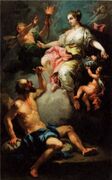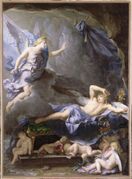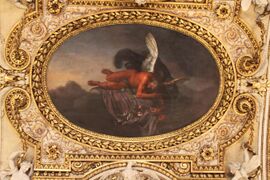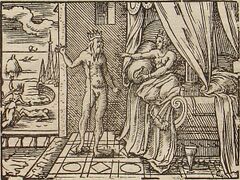Unsolved:Morpheus
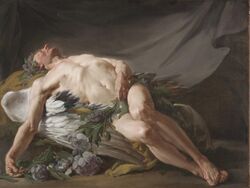
Morpheus ('Fashioner', derived from the Ancient Greek: meaning 'form, shape')[1] is a god associated with sleep and dreams. In Ovid's Metamorphoses he is the son of Somnus and appears in dreams in human form. From the medieval period, the name began to stand more generally for the god of dreams, or of sleep.[2]
Ovid
In Ovid's Metamorphoses, Morpheus is one of the thousand sons of Somnus (Sleep).[3] His name derives from the Greek word for form (μορφή), and his function was to appear in dreams in human guise. According to Ovid "no other is more skilled than he in representing the gait, the features, and the speech of men; the clothing also and the accustomed words of each he represents."[4] Like other gods associated with sleep, Ovid makes Morpheus winged.[5]
Ovid called Morpheus and his brothers, the other sons of Somnus, the Somnia ("dream shapes"), saying that they appear in dreams "mimicking many forms".[6] Ovid gives names to two more of these sons of Sleep. One called Icelos ('Like'), by the gods, but Phobetor ('Frightener') by men, "takes the form of beast or bird or the long serpent", and Phantasos ('Fantasy'), who "puts on deceptive shapes of earth, rocks, water, trees, all lifeless things".[7]
The three brothers' names are found nowhere earlier than Ovid, and are perhaps Ovidian inventions.[8] Tripp calls these three figures "literary, not mythical concepts".[9] However, Griffin suggests that this division of dream forms between Morpheus and his brothers, possibly including their names, may have been of Hellenistic origin.[10]
Gallery
-
Aurora wakes Morpheus by Bartolomeo Altomonte (1769)
-
Morpheus and Iris, by Pierre-Narcisse Guérin, 1811 Hermitage Museum
-
Morpheus awakening as Iris draws near by René-Antoine Houasse (1690)
-
Fresco in the gallery of the Palazzo Medici-Riccardi in Florence: Charon's boat, the sleep of Night and Morpheus by Luca Giordano (1684–1686)
-
Evening or Morpheus by Charles Le Brun
-
Morpheus appears to Alcyone. Engraving by Virgil Solis for Ovid's Metamorphoses Book XI, 650–749.
-
Morpheus appears to Alcyone. Engraving (or etching more likely) by Bauer for Ovid's Metamorphoses Book XI, 633–676.
Namesake
- Friedrich Sertürner derived the name of the opiate drug morphine from the name of Morpheus.
- 4197 Morpheus
See also
- Gates of horn and ivory
- Oneiroi
- Dream (character)
Notes
- ↑ Griffin, p. 249; Grimal, s.v. Morpheus, p. 296; LSJ s.v. μορφ-ή.
- ↑ Kearns, s.v. Morpheus p. 968; Griffin, p. 248.
- ↑ Grimal, s.v. Morpheus, p. 296; Tripp, s.v. Somnus, p. 534; Ovid, Metamorphoses 11.633–677.
- ↑ Ovid, Metamorphoses 11.633–638.
- ↑ Grimal, s.v. Morpheus, p. 296; Griffin, p. 243; Ovid, Metamorphoses 11.652–653.
- ↑ Ovid, Metamorphoses 11.613.
- ↑ Griffin, p. 249; Ovid, Metamorphoses 11.638–643.
- ↑ Griffin, p. 249.
- ↑ Tripp, s.v. Somnus, p. 534.
- ↑ Griffin, pp. 179, 249.
References
- Britten Austin, Paul, The Life and Songs of Carl Michael Bellman: Genius of the Swedish Rococo. Allhem, Malmö American-Scandinavian Foundation, New York, 1967. ISBN 978-3-932759-00-0.
- Burton, Robert, The Anatomy of Melancholy, Philadelphia, New York: J. W. Moore, J. Wiley, 1850. Online version at the University of Michigan Library.
- Griffin, A. H. F. (1997), A Commentary on Ovid, Metamorphoses XI, Hermathena, 162/163, Dublin: Trinity College Dublin, pp. 1–290.
- Grimal, Pierre, The Dictionary of Classical Mythology, Wiley-Blackwell, 1996, ISBN 9780631201021.
- Kearns, E. (1996), "Morpheus", in S. Hornblower; A. Spawforth, Oxford Classical Dictionary (3rd rev. ed.), Oxford, ISBN 9780198661726, https://archive.org/details/isbn_9780198661726.
- Ovid. Metamorphoses, Volume II: Books 9-15. Translated by Frank Justus Miller. Revised by G. P. Goold. Loeb Classical Library No. 43. Cambridge, Massachusetts: Harvard University Press, 1916. Online version at Harvard University Press.
- Tripp, Edward, Crowell's Handbook of Classical Mythology, Thomas Y. Crowell Co; First edition (June 1970). ISBN 069022608X.
id:Oneiroi#Morfeus
